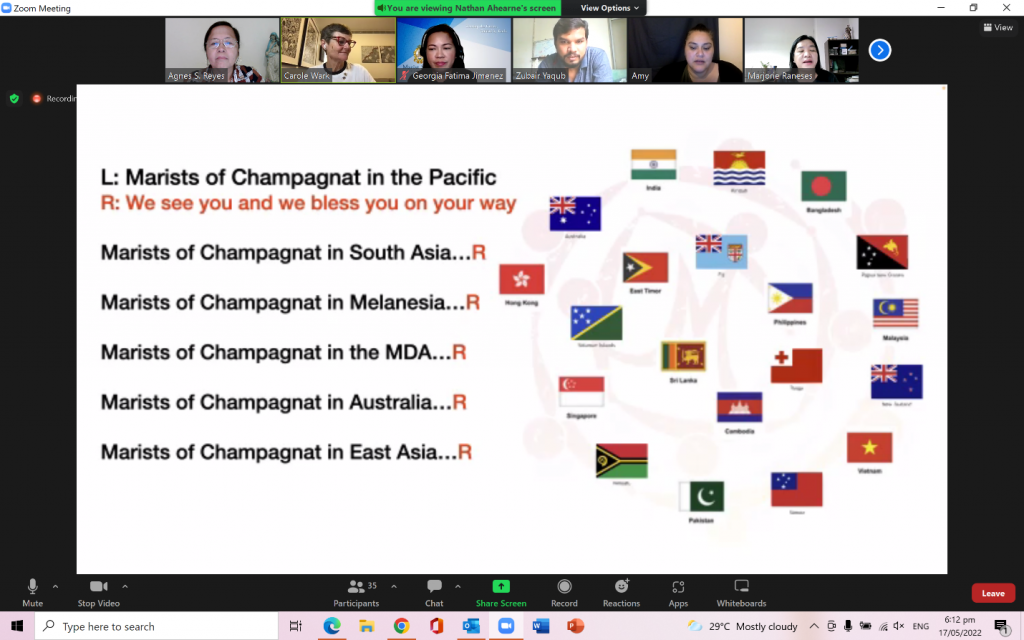Sharing 15 – The Lay Marist Vocation
Download PDF: English | Español | Français | Português
PRESENCE AND FOLLOWING JESUS IN THE WAY OF MARY
Elma Rafil – Chairperson, Asia Laity Commission
With joy we share with you this issue of Sharing Bulletin where stories and testimonies reflect much of what life is for our fellow Marists in Asia. In this issue we highlight the theme of “presence” and “following Jesus in the way of Mary”.
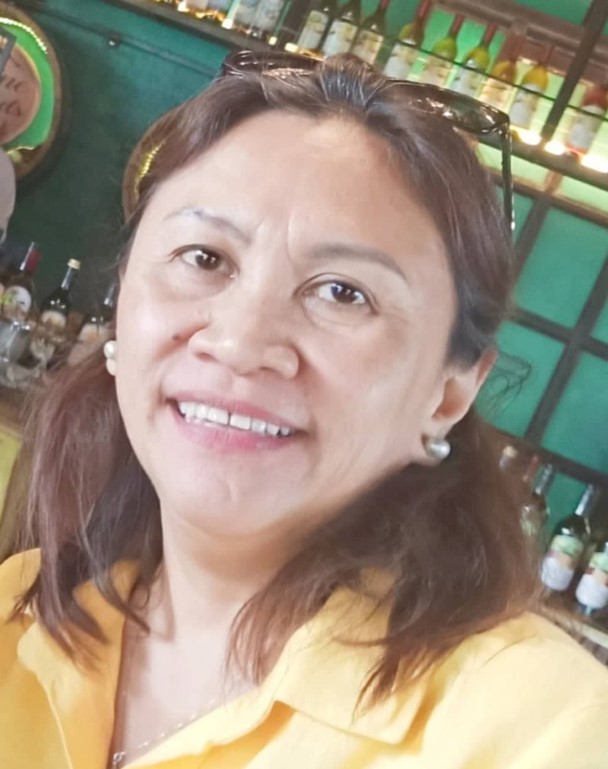
Woven in the expressions of our life stories are the current struggles Marists of Champagnat face particularly in Sri-Lanka where they are beset with dire economic crisis. What the testimony offers us is the glimmer of hope and the strength of transcending difficulties, remaining true to the quality of Marist presence lived in the most challenging context. Also, we share with you how in the diversity of cultures, we find connections and live out the call for meaningful presence in following Jesus in the ways of Mary.
A special report on our Asia-Oceania interregional experience of the process of the International Forum on the Marist Lay Vocation will be shared herein as it has impacted our experience of nurturing our vocation.

May our stories in Asia connect with your own and together we celebrate our gratitude for the gift of being Marists today.
This month’s issue has been prepared by the Asia Region.
PRESENCE BEYOND COMFORT ZONES
Romana B. Yecyec – CMMF, Philippines
The retirement journey could be more meaningful when you are actively involved in community relationships. My partnership with the Philippine National Police Provincial Mobile Force Company of Cotabato Province as chairman of its Advisory Council had deepened my Marist mission to reach out to tribal communities affected by armed conflicts, damages brought about by earthquakes poverty, and the COVID-19 pandemic.
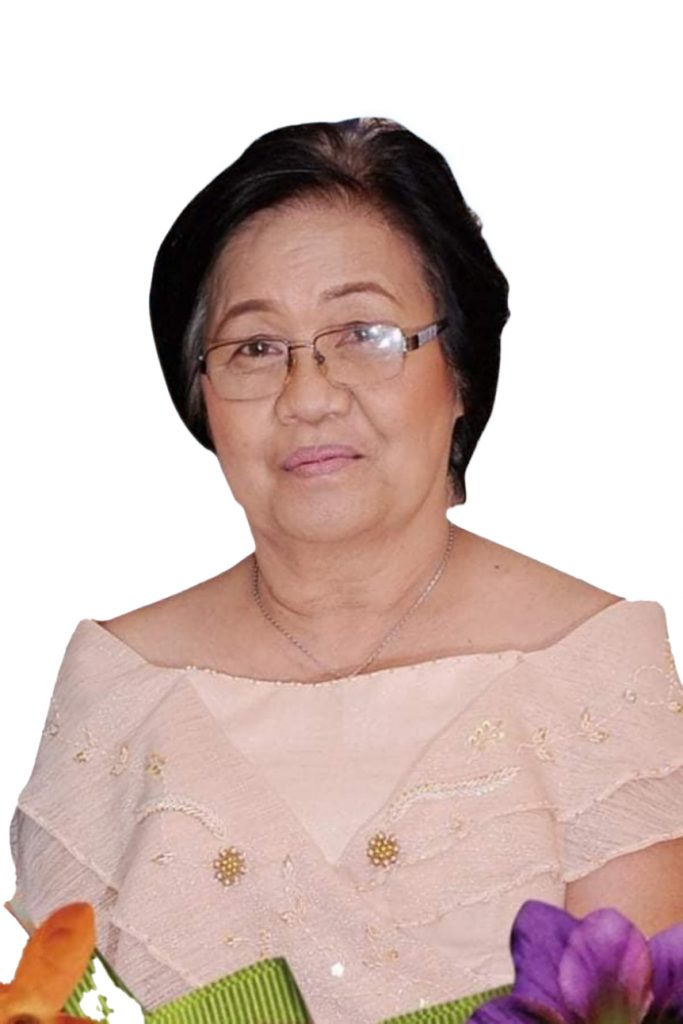
For more than seven years, after retirement until the present, going beyond my comfort zone, and valued time management had provided opportunities to extend services through education like drug awareness, church programs, and linkages with government and institutions that are instrumental in providing support to the less privileged communities deepened with the continuous collaboration of Philippine National Police and Tribal communities, especially in the least privileged areas.
Valued time, embraced Marist values, strengthened faith in God, and touched more lives would make one’s retirement life meaningful.
FOLLOWING JESUS CHRIST, INSPIRED BY MARY – ITS REALITIES AND CHALLENGES IN ASIA
Ivy B. Yecyec – Philippines
My life is a meaningful journey with Marists. I have been in Marist formation since my younger years when my mother conceived me while she taught in high school in 1981-1982. I was molded by Marist Education from kinder to college at Notre Dame of Kidapawan College (NDKC) from June 1988 to March 2003. Who could think that I was also employed in my alma mater in June 2003 after I graduated with my bachelor’s degree? Working with Marists and fellow laypeople seemed to be unique and an extra mile beyond measures being a product of a Marist School.
Although I was hybridized with Atenean education in postgraduate, the Marist way and charism surmounted in the midst of one’s exciting voyage of life in this VUCA world.
Who could imagine how I faced the past silent challenges for life is not always a bed of roses?
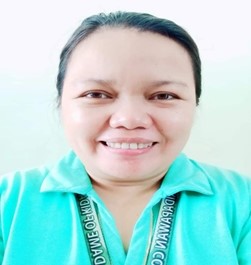
Looking back at the glimpses as a Lay Marist, my vocation sprouted by being enriched with various local and international formations and nurtured with my pro-active community and church involvements. Moreover, the influence of my whole family who is all Marist graduates of NDKC enthused and created an impact on my life.
Furthermore, I became a young member of the Champagnat Movement of the Marist Family (CMMF) in 2004 with such an unexpected invitation from the first NDKC Champagnat Movement of the Marist Family animator and the warm welcome of the family. With the openhearted atmosphere of the pioneering CMMF members in the Philippines organized in July 1989, I became an active member for almost 18 years together with my mother, a Marist Affiliate.
We joined in various CMMF provincial assemblies with my father and in community extensions from 2006-2011 before I was elected as an assistant animator by the group and later, a lead animator of CMMF Kidapawan in 2012 in the midst of a challenging time up to present. We were able to sustain in spite complexities of time and journey an extra mile in the peripheries with the unified and voluntary efforts of active members since before having varied activities such as regular gathering prayers & reflections, home visitations of sick members, and retired personnel, community services in depressed areas, abused children, poor students, IP communities, mission, etc. even during earthquakes and COVID-19 pandemic in creative ways be face to face or on-line. For almost a year, we’ve been reflecting on the document, Homes of Light, as well as gathered in prayer in our monthly faith sharing.
Despite the past trials, limitations, imperfections, and tests of time, I couldn’t imagine how I was able to survive and endure those life challenges. Strong faith certainly prevails to withstand, persevere, and hold on. I believe sincere prayers bring miracles. True Marists also supported and encouraged me to continue serving, leading, and helping others with multitasks even during the pandemic and past catastrophes. Indeed, my personal encounter with God in those people I encounter and journey with give me strength and provide support to surpass everything. I overcome challenges in the roughness of the road in my life journey strengthened by my commitment to move forward with the enlightenment of Marist values and Jesus Christ as my kindling light with the inspiration of Mary, our good mother, and ordinary resource.
By following Jesus Christ, being inspired by the Blessed Virgin Mary, I carry on my mission of making a difference in youth ministry in school and parish, vocation support promotion in the diocese, environmental advocacies in the community, living Marist ways in the best that I can as exemplified by Saint Marcellin Champagnat, our founder and model of faith, in prayer and in responsive action to those in need wherever I am.

Ad Jesum Per Mariam! To God be the glory!
FOLLOWING JESUS, INSPIRED BY MARY
Br. Jiji Dhasan – Marist District of Asia
The world has seen quite a big number of people who had made an impact on world history. This list of great personalities is always dominated by men but there are also some exceptional and extraordinary women who made the world quite surprised with what they did and achieved through their hard-fought lives. The one who stands out among them is none other than Mother Mary who without any doubt was an instrument of God and played a vital role in bringing God’s kingdom on earth through her son Jesus Christ. So, what is Mary paid in return for the struggles and difficulties she went through even as a young girl in keeping her faith in God? Of course, there is no doubt that Mary is glorified as the mother of God, and the whole Christian world, except a few, accepts Mary as their model and mother.
There is no country that has no church or chapel built or dedicated to her name; her influence is felt wherever Christians live, even the Muslims in Pakistan and Hindus in some parts of India have a great devotion to her as the Muslims call her Miriam in their holy book Quran and the Hindus call them “Karunai Matha” meaning “compassionate lady”.

We strongly believe that the presence of Mother Mary had made a very big impact on the life of Jesus and helped him develop a kind positive attitude towards life, especially in his mission to proclaim the kingdom of God. Still even today her images as a good and compassionate mother in the Catholic Church make a very strong impact on its faithful and help them shape their lives in the Christian way of life. Today in some way, the Christians stand out as unique people and an example to other religions. The way we treat, help, greet one another, and live our lives are very much appreciated and admired by our neighboring religions. we believe that it’s partly because of Marian’s attitudes such as loving, caring, and helping that we have inherited from her and try to put into practice.
Thus, Mary is given to us as the model of what it means to be a Christian, a disciple. In that sense, Mother Mary becomes a true and first disciple of Jesus because she listens to the word of God and does it accordingly and generously in her life. Mary becomes the first disciple of Jesus. The word she hears from God through the angel Gabriel doesn’t ask or command her to lie on a rosy bed but demands her to walk on a thorny path. The difficulties and the challenges she had faced in her life in the process of giving birth to Jesus and preparing him to achieve salvation for the whole of humanity are indescribable, and this is what also made her the first disciple because of her perseverance and faithfulness in doing the will of God. As she became a faithful believer of God by listening to His will and fulfilling it by bringing His only son to the earth, she also became a disciple of Lord Jesus Christ since he was sent by God to do His mission. God the Heavenly Father and Jesus are one in characteristics even though they differ in names. So, if Mary becomes a believer of God, then she also becomes a disciple of Jesus as a believer of God means to be a disciple of Jesus God’s only son.
We have come to encounter many cultures and traditions. Today we feel that we have been part of all these cultures in one way or the other. As a person who knew only one culture and was also very much rooted in his own culture. Now we feel very blessed and pleased to claim that all the cultures we are connected with MDA. It was in fact very difficult for us to come away a little bit from the mindset of our culture since whatever we had learned in accordance with the rules and norms of life was aligned with our culture. We had earlier expressed that we had great difficulty in adopting a new life in our community. One of the main reasons for it was living with people from different cultures and societies. At times, we found it so hard to accept some of the things done by my fellow companions just because they seem to be completely opposite of what we would do in that same situation. we experienced cultural differences in many ways. Some of them might be in the way of food, dressing, using language, and doing rituals. we never knew and never even thought that there would be meats cooked with sugar (sweet meat recipe) and of course, the famous Balot. These kinds of cooking were very strange for us. It looked so funny to us. There were also many differences in the way of doing rituals on particular occasions like welcoming, gathering, and bidding farewell. Then things seemed to be strange, funny, different, and meaningless. Such attitude and mentality show our immaturity and narrow-mindedness when it comes to learning and respecting the goodness of other cultures. Thus, we failed to understand the relevance of these differences but today what we have come to learn is that there is passion, meaning, tradition and a sacred story behind all these differences and that is what makes MDA an interesting place to live in because each difference was a learning experience and an opportunity for us to enjoy the beauty of those cultures. we have also come to realize that what we do in the name of my culture might be not acceptable to someone from a different culture and vice versa. There is nothing right or wrong in the differences between cultures. It’s all about the attitude of understanding, accepting, and respecting each culture with complement. This is what we have come to understand, and this is what has given us the hope and courage to say that we can adopt any culture and live in peace and harmony with all the differences and unfamiliar things it brings into our life.
So, this is the time for you and me to look into our lives to see the risks and challenges we face from the world today and ask ourselves the question “are we really courageous and confident enough to take up those challenges in order to bring a change which is good for the society we live in or belong to? How much faith do I have in myself, in others, and especially in God? How solid is that faith in comparison with that of Mother Mary? I leave all these questions open for you and for me.

Let us take our time and reflect on them and try to learn the Marian ways and do things in the Marian way.
TRUST IN THE WORK OF GOD
Tran Van Thanh, leader of GDDM, a lay Marist Group in Vn
Belief, trust in God, and her worry for the wedding host and others could be the feeling of Mary when she asked Jesus for the first miracle to change the water into wine at the Cana’s wedding. Similarly, to that situation, the Marist Brothers in Marist District of Asia. Since, the very beginning of 2007, when the first Marist Brothers came to the MDA and especially to VN, those feelings of wonder, and trust in the work of God are always present when a group of missionary foreign Brothers came.
As the person who joined the Marist Formation program for seven years up to Novitiate, I have experienced how the Brothers have faced the different challenges of the young formations as well as the government, cultures in many countries in Asia. For instant: when I was a postulant in Ho Chi Minh City, Br. Antonio asked us to clean up the computer desks. We did clean up but not in the way that he wanted us to. Therefore, he got angry and started to yell at us. His face became as red as a fighting cock in our eyes, so we started to laugh unstoppable. He got furious after that. However, he was able to calm himself down and guided us again to finish the task. Through that, I could see how generous and trusting in God he was.
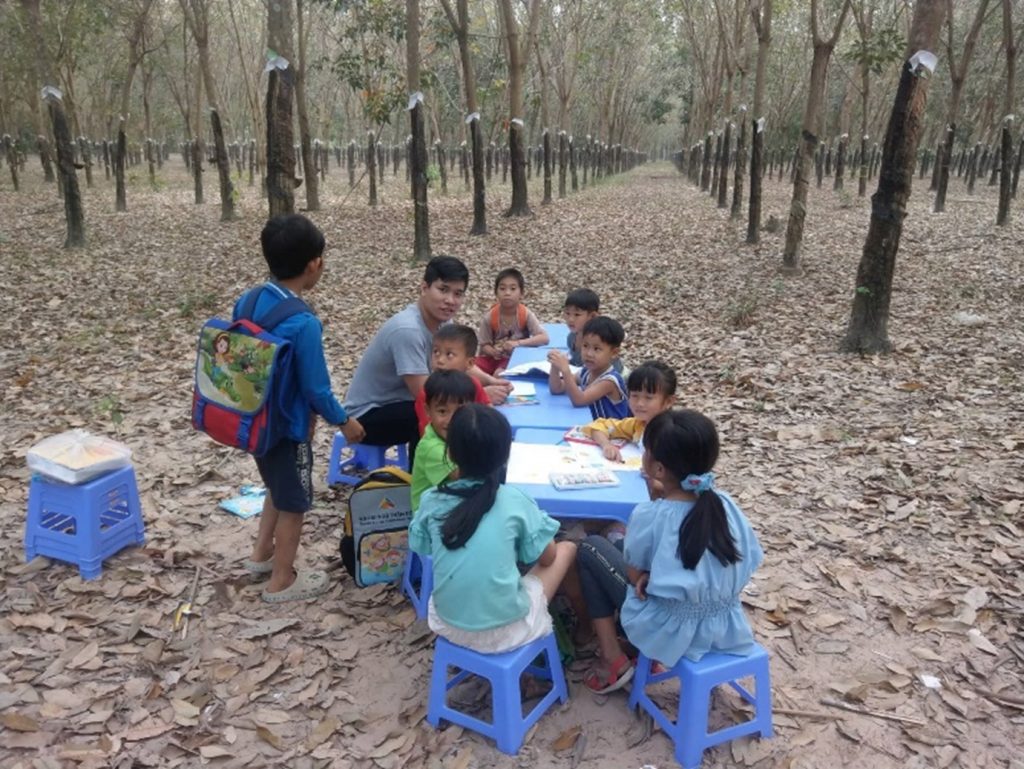
When I left the formation house in Sri Lanka and came back VN, I became a lay Marist volunteer working at the TA DO project in Tay Ninh province – VN, helping children of the migrant people learning how to read and write. I felt clearer the hardship that Marist Brothers were facing in this project.
I remember another occasion when we were teaching the children under the trees, there was a group of police men came to stop us and took us to the local police station. They told us that we were not allowed to teach and be with the children anymore. They diddn’t welcome us and if we kept continuing they would take our ID cards. Honestly, I was shocked at that time. These are the realities of Marists in VN that I want to show you. Hopefully, through this meeting and from others’ experiences I can learn how to deal with those difficulties so that we can bring and build up the Lay Marist in VN
THE CHALLENGE OF INTERCULTURALITY
Zubir Yaqub – Pakistan
There is beauty in diversity because it brings new ideas, opinions, and ways to interact with each other. Furthermore, diversity compels one to find novel approaches to improve life of every individual in the group or in the society. We all are unique and different from each other which are obvious in the very families we are born.
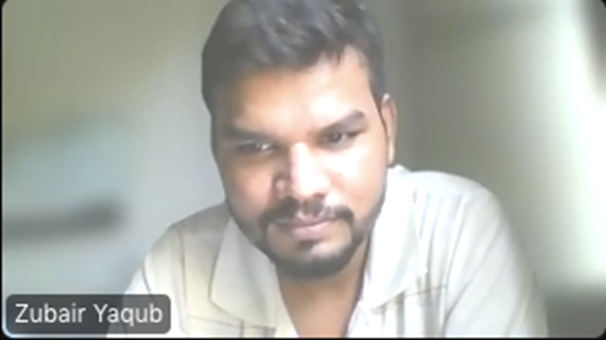
It is beautiful at the same time challenging as well because we never master people’s moods and way of dealing life, yet still we live in collaboration and in the family spirit. It is more like “lamb living with the lion” (Isaiah 11:6). Therefore, if we have learnt to live with different family members, then why to be afraid from intercultural societies. Let us accept each other in the mission as we accept in the families.
Living within a different culture is full of challenges because it demands one’s willingness and commitment to accept others. We the Asians, though belong to the same continent yet varies in physical features, family traditions, historical and cultural aspects, foods, so much so that we follow different faith traditions. Yet, we are trying to live in harmony, with understanding and respect towards each other.
In this context, if I speak of the Marist mission, you can imagine how much divers and different we are. If we go against each other everything goes upside down and if we are in union with each other then it is heaven on earth, “lamb eating with lion”. More like beautiful flower vas with variety of flowers, which increase beauty with its different color contrasts. I am glad to say we the Marists have mastered this approach. Our multicultural communities and study centers challenge us and help us to think out of the box. That allows us to share our ides, thoughts, feelings, and believes in respectful way, so we find home out of the home.
This very diversity does not separate us rather unites us. Allow us to interact with others. Bring youth closer to us so we may not forget why we are called for. This encourages us to share our Marist family spirit and being present in the midst of the youth.
Pope Francis echoes the same thing in his video message on intercultural 13 August 202,
“Your presence is necessary so that an enculturated theology can be offered and developed, one that can, of course, be adapted to local situations and can be a vehicle for evangelization. Let’s not forget that a unenculturated faith is not authentic. For this reason, I invite you to participate in the process that will provide the true sense of a culture that exists in the soul of the people. Enter into the life of the people of faith; enter with a respect for their customs, their traditions, seeking to carry out the mission of enculturating the faith and of evangelizing the culture”.
Interestingly enough, we are very much aligned with the teachings of the church and with its needs. What Holy Father is asking now, we have been doing from the very day when we are founded, “Every diocese in the world figures in our plans”. This shows the far sighted of Marcellin and task for all of us who called themselves Marist. This is why Sean D. Sammon calls him “A Heart That Knew No Bounds”.
Br. Hadayat Deen, Sector leader in Pakistan, responded to question by giving a concert example to master the skills of interculturation. He puts it in this way;
“Intercultural communities are symbolic interpretive transitional contextual process in which people from different cultures create shared life and to overcome the intercultural challenges through little acts of kindness. Example to this could be cultural communication. He believes miscommunication creates problems. To avoid conflicts and built up the community one may have proper communication skills such as,
- Avoid slang words
- Speak slowly
- Keep it simple.
- Practice active listening.
- Take turns to talk
- Write down things before hand
- Take notes
- Watchful using sense of humor
- Be supportive.
- Be open to learn new and different things”.
Looking at all this we can say it is not difficult to live in diversity as long as we are open to the spirit, ready to let go of our personal agendas, to look for the common good, and prepared to go an extra mile when required. Then it is Asian or any other culture challenges may be different yet can overcome through the very spirit we live in. As Apostle Paul said there is “one Lord, one faith, one baptism” (Eph. 4:5). This is the very uniting force us all rather dividing or separating.
To conclude, the interculturality entails interactions between individuals and their cultures at large, therefore, the key challenges could be building mutual trust, overcoming the sense of insecurity, making adjustments with foods, language and behavioral patterns, and more importantly constantly choosing to remain open and receptive.
Life-giving intercultural communities could be established successfully if the individuals in these communities are keen observers, psychologically sound personalities, and persons of prayer.

May the Spirit of Lord help us to live in unity and may Mary our good mother be present in our midst
GIVING BROADER SENSE OF BEING LAY MARIST TODAY
Chalana Pragnaratne, Sri Lanka
After 74 years of getting political freedom from colonial rule, Sri Lanka has been continuously tormented by its own politicians due to their corruption, mismanagement and divisions created, without a proper long-term Strategy to uplift the country to prosperity.
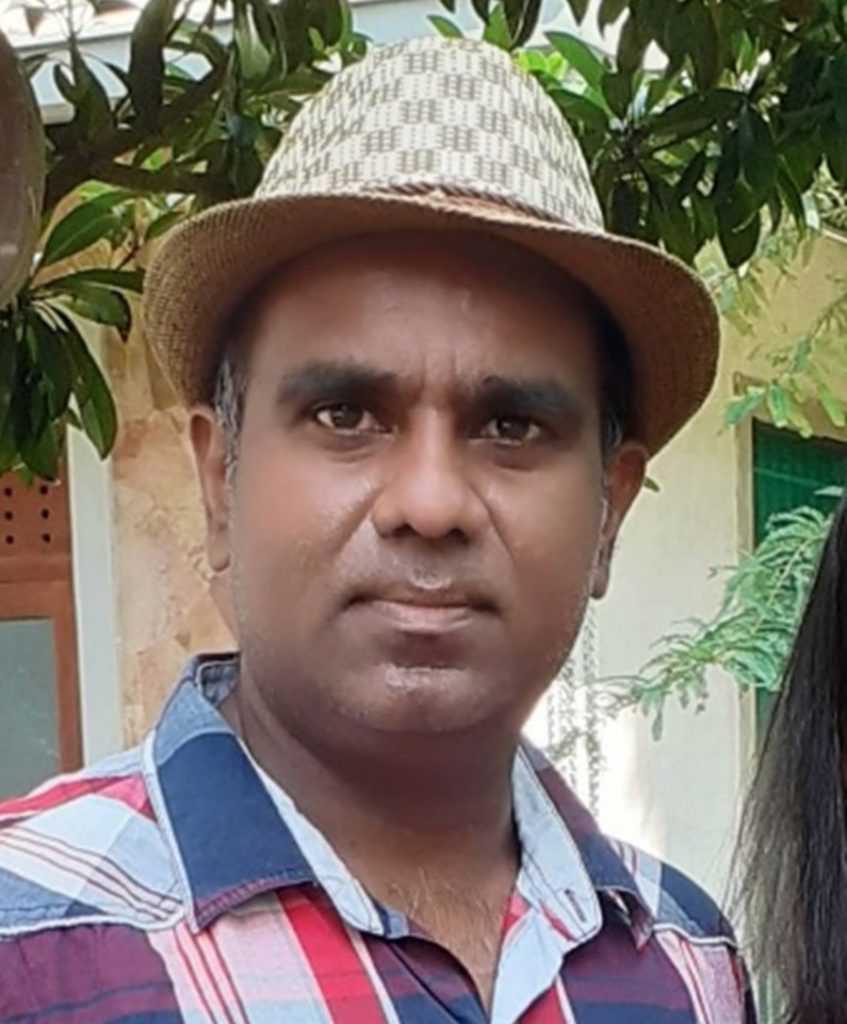
Due to shortage in foreign currency reserves, Sri Lanka is now in a socio-economic crisis. As government suspended the payment of international sovereign bonds, international rating agencies further downgraded Sri Lanka questioning its credibility. YoY core inflation in May was 37%, and the continuous price increase in essential food items including general prices level of all goods have been sky rocketed, creating more pressure on the marginal and middle-income earners. As the country doesn’t have foreign currency to import fuel, a sever power and energy crisis is prevailing around the country for several months. Long queues for fuel, cooking gas, essential foods, could be seen around the country. Schools are closed from time to time due to transportation issues. Increasing Unemployment, poverty and hunger will bring many challenges in days to come.
Inevitably, the country is walking towards a recession. So, youth are protesting for a system change and political reforms, perceiving that country is heading for a chaos. For past several months youth, labor unions, religious leaders including Buddhists, Catholic, Hindu, Muslim, etc. and many independent groups continued to protest against the corruption and mismanagement of the ruling government.
Lay Marists continued to support these peaceful protestors, as we firmly believe that we need positive change in the political structure in the country. Lay Marists supported these protesters by supplying water, food and other essentials. With the help of sponsors, several campaigns were organized to give relief and support to marginal communities by providing dry rations and other food supplies.
Just as the invitation of Mary which stimulated Jesus to replace old wine with new wine, Lay Marists are also invited to be instrumental in this journey. As Lay Marists, we strive to achieve gender equality, change in existing education system, demilitarization, decentralization of political power, transparency and Judicial justice for all our communities. We firmly stand for these aspects and many more as they give broader sense to our Lay Marist vocation.
We are now in the process of identifying and planning new avenues to assist children within the current context. As we are now short of medical supplies including many kinds of drugs, we invite all communities around the world to assist our people in Sri Lanka. We are grateful to you all, for your fervent prayers, that will bring healing to all the wounded people in Sri Lanka.
INTERNATIONAL FORUM ON THE LAY MARIST VOCATION
ASIA-OCEANIA Interregional Gatherings
Agnes S. Reyes – Secretariat of Laity
The Asia lay leaders are deeply grateful to the Oceania Lay Leaders for the meaningful collaborative engagements in the journey towards nurturing Marist lay life. The deep value of the encounters is worth sharing in this issue.
Three 75-minute online gatherings were held on 26 April, 3 May, and 17 May 2022, with 50 Marists from Asia and Oceania gathering online for an interregional experience of prayer, discussion, and activities on the Lay Marist Vocation Forum. It was a melting pot of culture, language, and Marist spirituality, with participants Zooming in from over 16 countries.
Nathan Ahearne who leads the steering committee, shares his report on some of the participants responses and insights into the impact of the Interregional Gathering:
“One of the beautiful things about being in this interregional forum is the reminder we are not “alone” in this so-called Marist lay life. Rather — as we expand beyond and get involved, we appreciate the beauty of the diversity of a big family where Brothers and lay come together in the same table to reflect, listen, share, and dream. Our sharings were opportunities for learning, bonding, appreciating, thus enriching and inspiring! Marist vocation is certainly alive!”
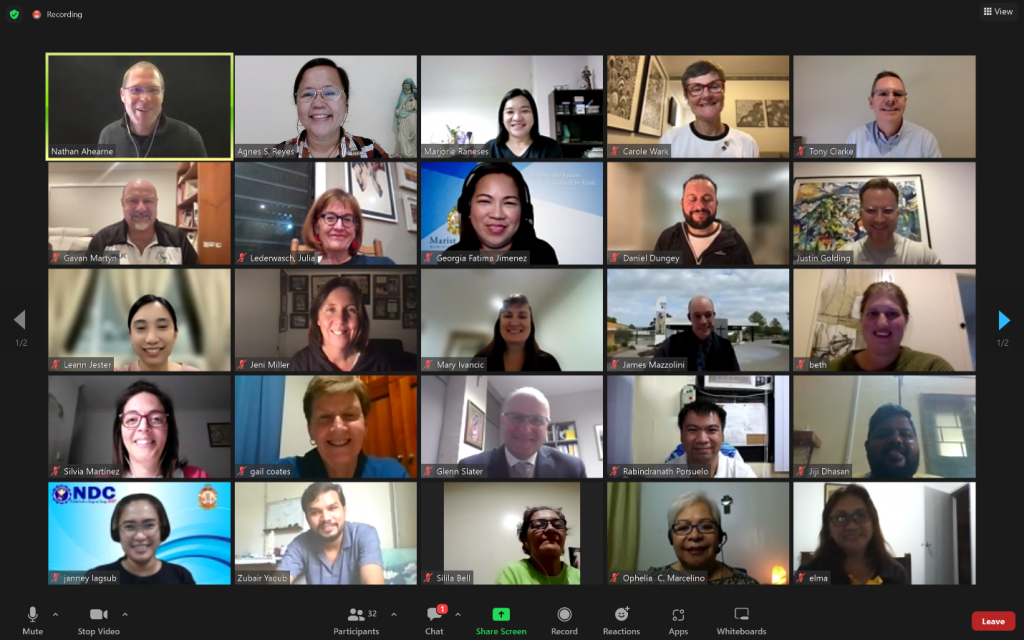
“As Marists we all have to strive to ‘keep Marcellin’s dream alive. The dawning of our new province provides a wonderful opportunity to reach out and work with and learn from our new neighbors. This gathering is a space where I feel at home. A home where we share experiences, reflections, ideas, hopes, dreams, and gifts in ministries, service, and leadership. It has made me appreciate the essence of what it means to be a Marist community: we are people of the same table.”
“This sharing at the same table echoes the experience of gathering at the table of our home. Our encounter with one another is our encounter with Christ that deepens not only our relationship within this Marist community—our Marist family but above all, my personal Marist lay vocation.”
The conduct of the said interregional gatherings was built on the purpose of offering an interregional formation experience that provides opportunities to explore issues about shared Marist life and mission in the regions of Asia and Oceania and to strengthen connections between the two regions and identify focus areas for future Joint Formation in Asia and Oceania.
What stands out, among others, as the most significant in the experience was that participants want more connection and a stronger sense of belonging to a global Marist family. From the richness of the Asia Oceania interregional gatherings, we continue to explore further creativities that will promote a global exchange of experiences to deepen shared Marist life and mission.
